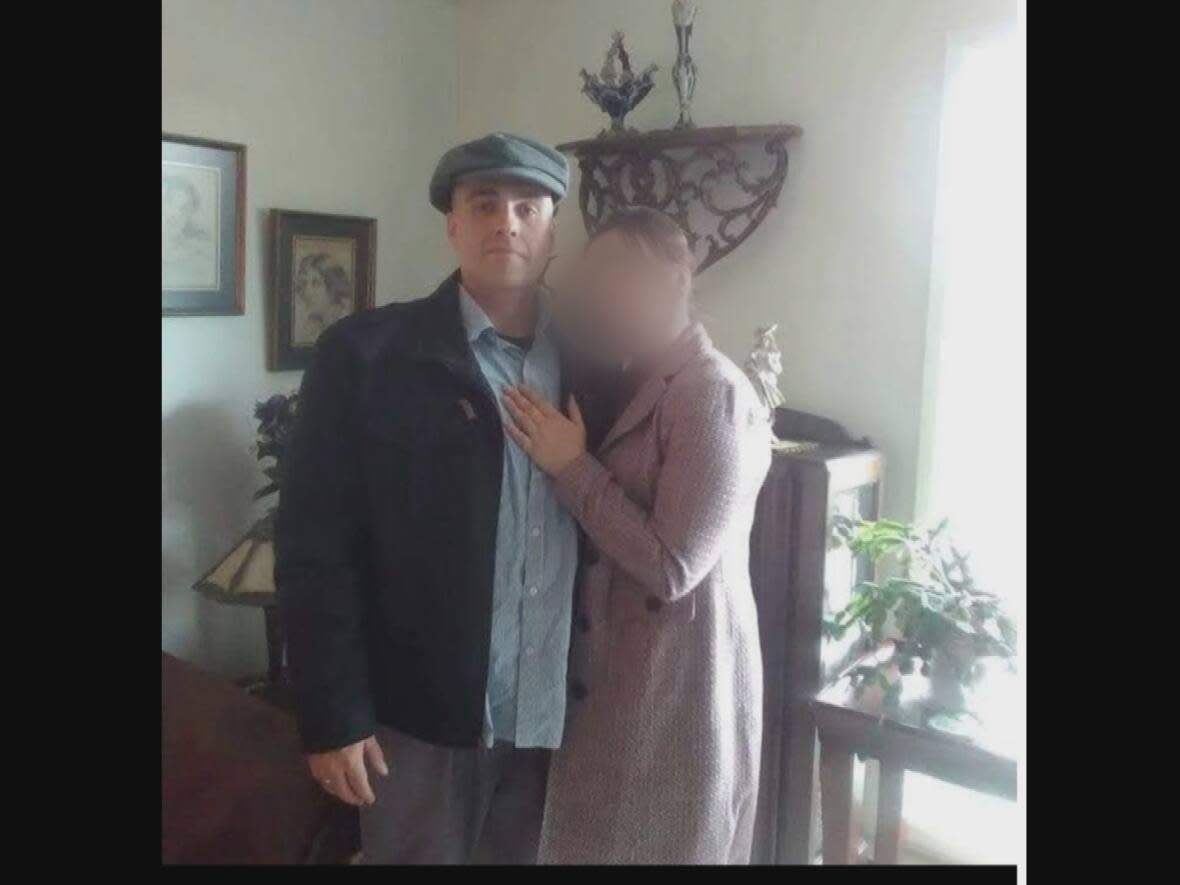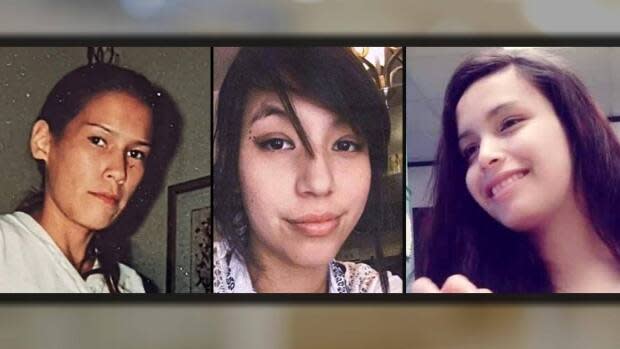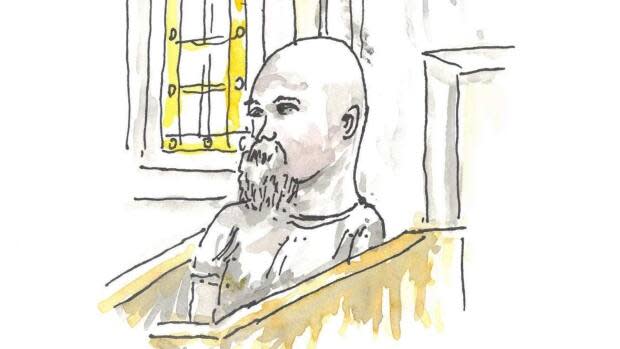Winnipeg serial killer's message to ex-wife before last killing said he might do '3 life sentences'

WARNING: This story contains distressing details.
The week before he was arrested, a confessed Winnipeg serial killer sent a Facebook message asking his ex-wife to forgive him if he ended up going to prison, his trial heard Thursday.
That was among a series of messages court heard Jeremy Skibicki sent the woman in May 2022, at which point the two had long been estranged, including one close to midnight on May 9 of that year telling her that he still "might not be caught," but "could be doing like three life sentences."
Skibicki is on trial for first-degree murder in the deaths of four women, who are believed to have been killed between mid-March and mid-May of 2022. The messages he sent his ex-wife came just days before investigators say he killed the last of his victims.
Skibicki, 37, is charged in the deaths of three First Nations women — Rebecca Contois, 24, Morgan Harris, 39, and Marcedes Myran, 26 — as well as the death of an as-yet-unidentified woman who has been given the name Mashkode Bizhiki'ikwe, or Buffalo Woman, by community leaders. She is believed to have also been Indigenous and in her 20s when she died.
Contois is believed to have been the last of the women killed, on May 14 or 15, 2022. Skibicki was taken into police custody on May 17 — a day after police discovered Contois's partial remains in garbage bins near the accused's North Kildonan apartment. More of her remains were later found at a Winnipeg landfill.
Court heard the morning before he was arrested, Skibicki sent his now ex-wife another message: "Lots to do today. Take care, baby."

Prosecutors have said the women's deaths were intentional and racially motivated, and that Skibicki preyed on vulnerable Indigenous women at Winnipeg homeless shelters before killing them and throwing their bodies into garbage bins.
The remains of Harris and Myran are believed to be in a different landfill outside Winnipeg, while police have not said where they believe Mashkode Bizhiki'ikwe's remains are.
While Skibicki was initially only arrested in connection with Contois's death in May 2022, he unexpectedly confessed to that killing and the three others, which police previously had no knowledge of.
Skibicki told police he strangled, choked or drowned the women, and confessed to performing sex acts on their bodies before dismembering some of them and throwing their remains into the garbage.

Skibicki's legal team says while he's admitting he killed the women, they plan to argue he shouldn't be held criminally responsible due to a mental disorder.
'Strikingly similar' abuse and violence: Crown
Skibicki's ex-wife, who is Métis, testified as part of the Crown's use of similar fact evidence in the trial, which prosecutor Christian Vanderhooft said will highlight abuse and violence perpetrated on vulnerable Indigenous women that "is so strikingly similar that they establish a modus operandi in the perpetrator."
Skibicki's defence team consented to allow the similar fact evidence in the trial, saying it plans to get its own expert to comment on some of the evidence later on.
The accused's ex-wife testified that sometime after getting the Facebook messages from Skibicki in May 2022, she decided to call him — because, knowing what he had messaged her and what their relationship had been like, she had "a feeling that something terribly wrong had happened."
She said Skibicki wouldn't tell her what happened, and said if he admitted to what he'd done that he would have to go on the run. The woman testified she ended up praying for him after that.
"I knew that he'd done something really bad, so I prayed that he would tell the truth," the soft-spoken woman said, wearing rose-coloured glasses that she told court she has to wear because of a concussion from an incident involving Skibicki.
He told her "that whatever he had done, that he'd come clean so that whoever or whatever had happened would have some closure," she testified.
Ex-wife details abuse
The woman told court she had not seen Skibicki in some time when they started messaging in May 2022. She said she was abused and routinely sexually assaulted in her sleep during their relationship.
The woman, whom CBC is not naming because she's a survivor of sexual assault, said Skibicki would regularly sexually assault her while she was passed out after taking sleeping medications at night, telling her he had a fetish called "Sleeping Beauty syndrome." She said he liked when she was "like a rag doll ... limp and lifeless."

She said she met Skibicki in February 2018 at the Siloam Mission shelter in Winnipeg. She went with him and two of his friends back to his apartment. She said she remembers Skibicki telling his friends there that he "really liked this one."
Though the relationship quickly became "volatile" and Skibicki "very controlling," the woman said she ended up marrying him later that year. When asked why, she said she felt "stuck." She was also struggling with a methamphetamine addiction at the time, court heard.
The woman testified she later got a protection order against him. But after getting out of addiction treatment, she had nowhere to go — so she went back to him again.
She said she got pregnant twice during their relationship, and at one point Skibicki talked about moving her out of town where no one would know where she lived, which he told her was needed to get her off drugs.
The woman told court Skibicki also once tried to suffocate her with a pillow, and would confine her against her will in their apartment, where she said he would take out the phone line and laugh at and spit on her as she sat naked for days.
She said he also showed her pornography involving a person killing a woman then performing sex acts on her body. Skibicki also told her that if anything happened to her, he planned to keep her remains in a closet and perform sex acts on them "until my body just started to stink too bad," she said.
The woman said she started to feel more protective of herself after that, and "[started] setting up protection with my family and friends, so that they always knew where I was."
She said one of their final confrontations before she left happened when Skibicki came at her with a butcher's knife, but ended up not stabbing her at the last minute. Not long after — sometime in March 2021 — she said her mom called to ask if she wanted to do laundry. She went and never returned.
She said while she knew Skibicki had moved to a new apartment in Winnipeg's North Kildonan area — the one where he's believed to have killed the four women — she never accepted his invitation to come over.
"I felt that if I went back, I wouldn't be able to leave again," she said.
During cross-examination, defence lawyer Leonard Tailleur questioned the woman about the Facebook messages Skibicki sent her in May 2022 — including one on May 10, 2022, where the lawyer said the accused told her "he was being manipulated by Satan."
Tailleur also asked the woman about her testimony during her application for a protection order against Skibicki, which included how she'd said Skibicki "was like Jekyll" and seemed like "it was three people" operating him.
She also attached to that application Facebook posts the accused had made, which included mentions of how he had "decided to become a holy crusader," Tailleur noted.
"I would suggest that you did it because you were concerned about his mental health. Do you agree with that?" the lawyer said.
"No, I don't," she said.
Skibicki's trial before Court of King's Bench Chief Justice Glenn Joyal continues Friday. Court is expected to hear from a woman who Skibicki told police he once had in his apartment "like a lion ... with prey in its mouth," but ended up letting go.
The trial is also expected to hear Friday from a man who handled a jacket that Skibicki prepared to sell in 2022 after taking it from the unidentified woman he killed.
The trial is expected to continue until June 6.
Support is available for anyone affected by these reports and the issue of missing and murdered Indigenous people. Immediate emotional assistance and crisis support are available 24 hours a day, seven days a week through a national hotline at 1-844-413-6649.
You can also access, through the government of Canada, health support services such as mental health counselling, community-based support and cultural services, and some travel costs to see elders and traditional healers. Family members seeking information about a missing or murdered loved one can access Family Information Liaison Units.


